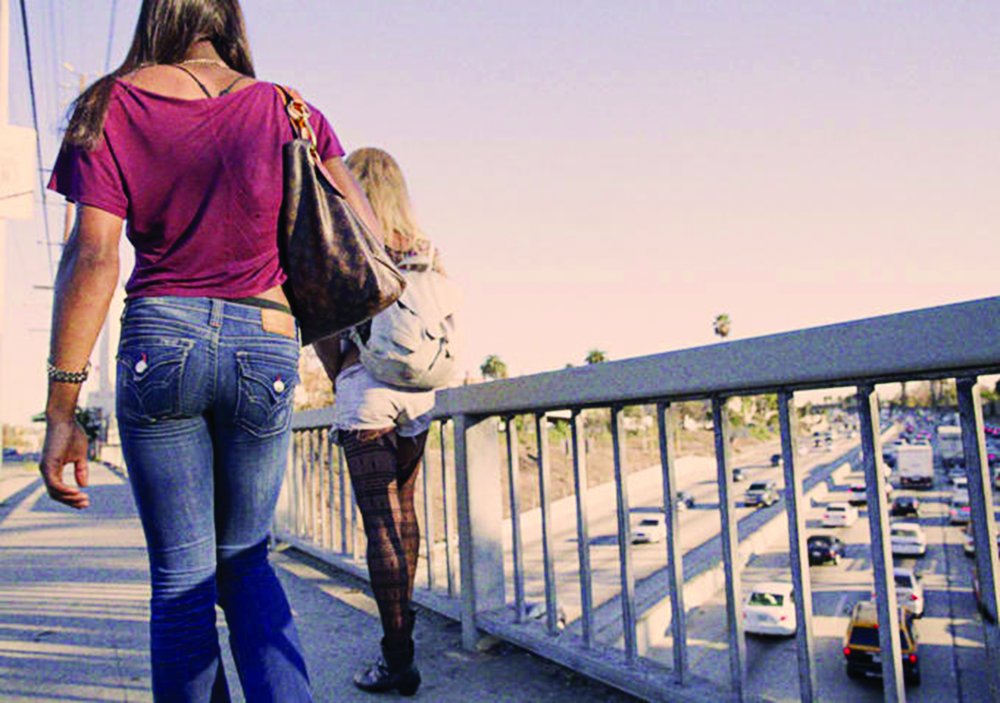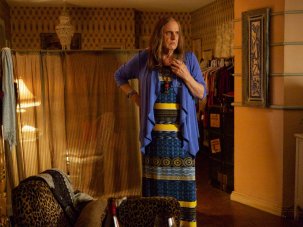You might assume that the most remarkable thing about Sean Baker’s touching and occasionally hilarious neo-screwball is the fact that it was shot on a handful of iPhones. The phones in question were only slightly modified – fitted with Kickstarter-funded lens adapters and software that allowed Baker to lock exposure and focus to his own specifications – but the result sits very comfortably on the big screen and never feels like a home movie. In fact, this zero-budget work-around produces a dreamlike, colour-saturated effect that perfectly matches the drug-tinged hyperreality of its protagonists’ lives on the seedier streets and corners of Tinseltown. Likewise, working with minimal equipment allowed the small crew to roam around their locations without drawing attention to themselves, giving the film an edgy, guerrilla feel.
USA 2015
Certificate 15 87m 45s
Director Sean Baker
Cast
Sin-Dee Rella Kitana Kiki Rodriguez
Alexandra Mya Taylor
Razmik Karren Karagulian
Dinah Mickey O’Hagan
Ashken Alla Tumanian
Chester James Ransone
Yeva Luiza Nersisyan
Karo Arsen Grigoryan
In Colour
[2.35:1]
Part-subtitled
UK release date 13 November 2015
Distributor Metrodome Distribution Ltd
► Trailer
But just as impressive is the quality of the performances, and the sheer big-heartedness of the story, which traces one incident-packed Christmas Eve in the lives of two transgender sex workers. The immediacy of the handheld camerawork – coupled with the actors’ semi-improvised dialogue, which is mostly drawled out in long strings of slang-peppered invective – plunges the viewer straight in at the deep end of their hardscrabble existence, where they eke out a precarious living while battling to maintain some dignity in the face of the ridicule and disgust of mainstream society. The result is so grippingly watchable that the type of camera being used is really neither here nor there.
As played by Kitana Kiki Rodriguez and Mya Taylor – both appearing for the first time on film – best friends Sin-Dee and Alexandra are both heroic and deeply flawed. Taylor plays Alexandra as the quieter, more cautious of the two, though her sweetness has a flinty edge that becomes more apparent as the plot thickens. In contrast, Sin-Dee, as played by Rodriguez, is a tornado of rage and emotional venting from the very first scene: having learnt that her pimp and supposed fiancé Chester (talented character actor James Ransone) has been cheating on her with a cisgender woman, she sets off to find them both and bring hellfire raining down on those who dare to disrespect her.
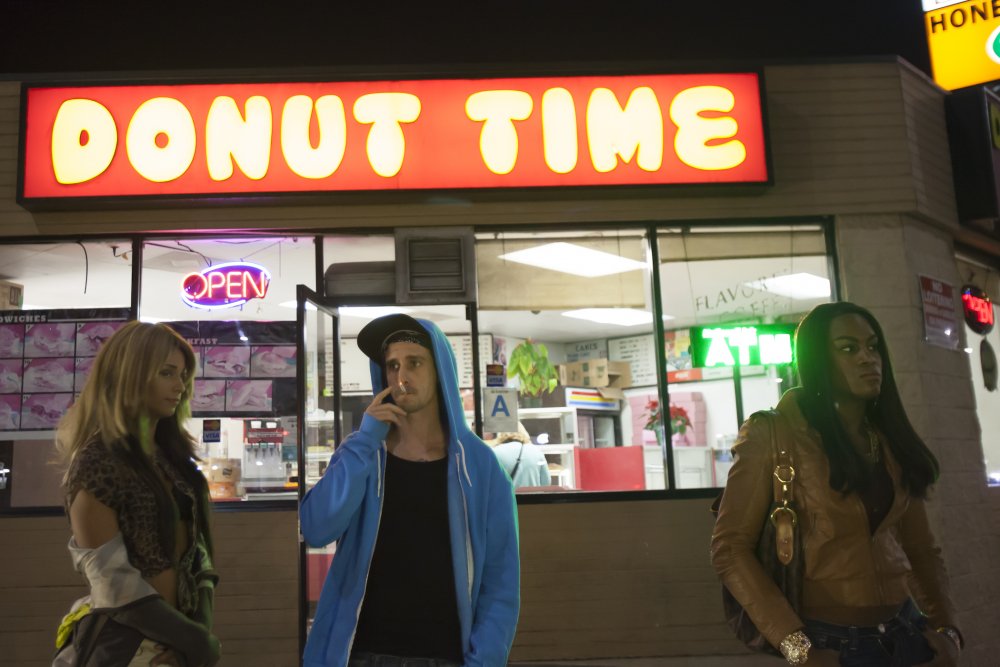
Interwoven with this love-rat revenge plot is another domestic drama: Armenian cab driver Razmik (regular Baker collaborator Karren Karagulian) is a long-term john of Alexandra’s and is, perhaps, in love with her. His own Christmas Eve has brought about a crisis in his marriage as he walks out on the suffocating festive meal prepared by his wife and overbearing mother-in-law (Luiza Nersisyan and Alla Tumanian respectively) and goes in search of Alexandra. For her part, Alexandra can think only about her big debut as the singer in a local bar; she has invested everything into what she hopes will be a life-changing opportunity, but will Razmik get there in time to show her some support?
By bringing these two disrupted love stories together, Baker teases out unexpected subtleties in a film that mostly majors on broad farce. The popular image of trans women as trashy, tart-with-a-heart loudmouths in impossible heels is a cliché that he can’t dodge and doesn’t try to; instead, he allows the context that creates and explains them to gleam around the edges: the precarious poverty that informs their everyday choices, and the emotional vulnerability that makes them a magnet for heartbreak.
Razmik, likewise, begins as a stock character – this time the hardworking but henpecked immigrant – but then becomes far more complex as the film gets under his skin. A series of vignettes supplied by his hotchpotch of taxi customers adds some welcome light relief to the narrative thread of Sin-Dee’s intense melodrama, but Karagulian’s sympathetic performance brings home the conflicted yearning of his romantic aspirations with the full force of tragedy.
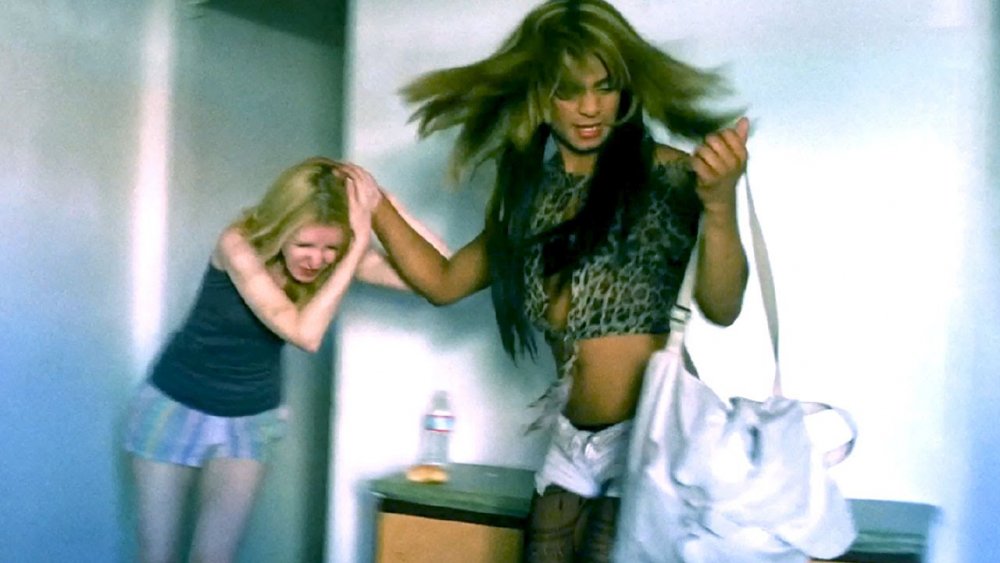
As well as the men who are attracted to Sin-Dee and Alexandra, Baker also insists that we consider the plight of the cisgender woman, Dinah (Mickey O’Hagan), who has taken up with Chester and must now answer to Sin-Dee. Dinah is a sleazy type with a bitchy attitude, but if she were ever invited to check her privilege, she’d have trouble finding any. Her life turning conveyor-belt tricks in a fleapit motel looks a lot worse than Sin-Dee’s defiantly freelance existence, and the two women come together in strange moments of mutual understanding as the intersections of their lives are brought to the surface. This generosity towards Dinah is typical of a film that never settles for obvious polarities or entrenches its characters in two-dimensional assumptions about their moral or strategic priorities.
As Sin-Dee drags Dinah through the streets like a medieval scarlet woman, the audience is pulled along just as insistently. Tangerine takes you by the scruff of your neck into a parallel world where tattered reality is shot through with neon flashes of colour, clarity and pure emotional honesty.
In the December 2015 issue of Sight & Sound
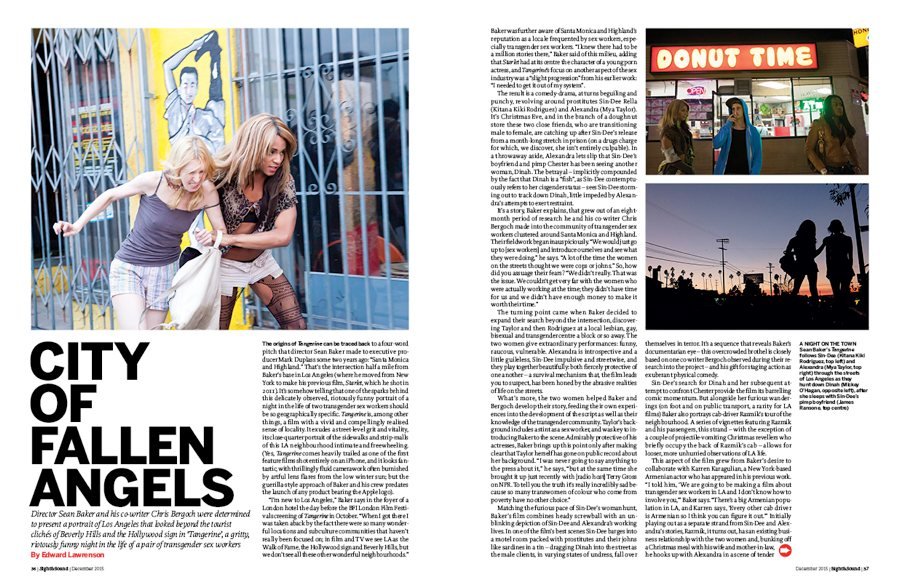
City of Fallen Angels
Director Sean Baker and his co-writer Chris Bergoch were determined to present a portrait of Los Angeles that looked beyond the tourist clichés of Beverly Hills and the Hollywood sign in Tangerine, a gritty, riotously funny night in the life of a pair of transgender sex workers. By Edward Lawrenson.
+ A moment of transition
In terms of trans representation on the screen and behind the camera, it’s popular television that’s driving the real change while mainstream cinema is struggling to catch up. By Sophie Mayer.
-
Sight & Sound: the December 2015 issue

Todd Haynes on Carol, queer cinema, period dramas, Patricia Highsmith and much more in the S&S Interview. Plus Spielberg’s Bridge of...
-
The Digital Edition and Archive quick link
Log in here to your digital edition and archive subscription, take a look at the packages on offer and buy a subscription.





